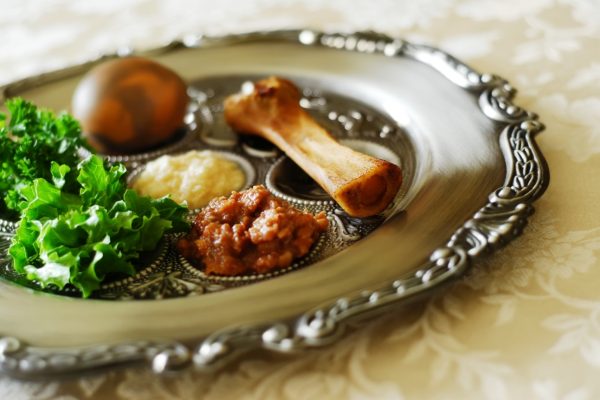Reader 1:
Tonight we gather together to welcome the month of Iyar. We rejoice in the holiday of Rosh ChodeshThe new moon, which marks the beginning of the Jewish month. According to tradition, because women did not participate in the sin of the golden calf, they were given the holiday of Rosh Chodesh. It is customary for women not to work on Rosh Chodesh. which, according to midrashA rabbinic method of interpreting text, often through the telling of stories., was given to our foremothers at SinaiAccording to the Torah, God, in the presence of the Jewish people, gave Moses the Torah on Mount Sinai (Har Sinai). as a gift for refusing to contribute their jewelry to be melted down for the building of the Golden Calf.
Reader 2:
Though many of us never heard of Rosh Chodesh as a women’s holiday when we were growing up, we now understand that like so much of our inheritance as Jewish women, the fact that we did not know about it doesn’t mean it didn’t exist. Many of our great-grandmothers probably did observe Rosh Chodesh, either by reciting a special techinePrayer ((Yiddish), particularly the prayers written by women in Yiddish throughout the ages. (woman’s prayer) or by refraining from certain kinds of work.
Reader 3:
What did these women do instead of work on Rosh Chodesh? Perhaps, like us, they gathered to talk about their lives, sing, laugh, cry, offer each other a little comfort, teach each other something new.
All:
Tonight we honor the traditions of our mothers and grandmothers. Traditions lost and traditions still being recovered.
Reader 3:
Turn to the person on your right and introduce yourself using your English, Hebrew and/or Yiddish name bat your mother’s name. Share the names of any other women whose memory you would like to bring into the room.
Reader 4:
Iyar is a month of transition. It falls between Nisan, the month of PesachPassover is a major Jewish holiday that commemorates the Jewish people's liberation from slavery and Exodus from Egypt. Its Hebrew name is Pesakh. Its name derives from the tenth plague, in which God "passed over" the homes of the Jewish firstborn, slaying only the Egyptian firstborn. Passover is celebrated for a week, and many diaspora Jews celebrate for eight days. The holiday begins at home at a seder meal and ritual the first (and sometimes second) night. Jews tell the story of the Exodus using a text called the haggadah, and eat specific food (matzah, maror, haroset, etc)., and Sivan, the month of ShavuotShavuot is the holiday fifty days after Passover and commemorates when the Israelite liberation from Egypt culminates with the giving of the Torah. Traditionally, Jews study in an all-night study session, eat dairy products (one interpretation is that the Torah is like milk to us), and read both the Ten Commandments and the Book of Ruth.. Iyar was the month in which the Israelites began their wandering through the desert, after leaving Egypt and before receiving the Ten Commandments.
Reader 5:
According to the rabbis, Iyar was the month when manna first began to fall from the sky. Manna was the food that sustained our people throughout their desert journey.
Reader 6:
Manna was a perfect source of physical and spiritual sustenance. It tasted different to each person and could taste like whatever the eater wanted to eat. (It was probably also highly nutritional and fat-free.)
Reader 7:
One of the rules about the manna was that you couldn’t collect more than you needed for that day. If you tried to save any for later it rotted. This was a way of building up trust between the former slaves and God.
Reader 8:
Rabbi Akiva explained that manna actually contained the splendor of the Shechinah, the indwelling presence of God, within it.
Reader 8:
Turn to the person next to you and talk for a minute each about something/someone in your life that is like manna. You can talk about something that exists or you can imagine it. Is it miraculous? How does it sustain you? How do you trust that it will still be there tomorrow?
Reader 9:
Iyar’s meaning has been expanded in contemporary times. Last week we observed Yom haShoah, HolocaustThe genocide of millions of European Jews--as well as other ethnic, religious and minority groups--by the Nazis during World War II. The tragic events of the Holocaust are now commemorated each year on Yom HaShoah; established in 1952 by the Israeli government. Shoah (calamity) has become the term used to describe the systemic mass slaughter that occurred during World War II. Remembrance Day, and this week we will observe Yom haZikaron, the day of remembrance for all those fallen in Israel’s wars, and then Yom haAtzma’ut, Israeli Independence Day.
Reader 10:
Let us sing together, using our collective voice to honor the memory of all those lost to us and to commit ourselves to a vision of a vibrant peaceful future for Jews in IsraelLit. ''the one who struggles with God.'' Israel means many things. It is first used with reference to Jacob, whose name is changed to Israel (Genesis 32:29), the one who struggles with God. Jacob's children, the Jewish people, become B'nai Israel, the children of Israel. The name also refers to the land of Israel and the State of Israel. and everywhere.
(Sing Israeli or Rosh Chodesh songs.)












